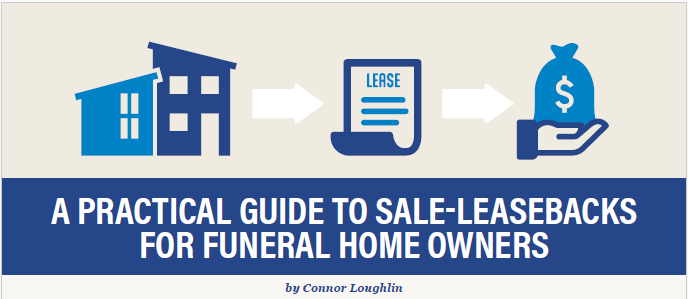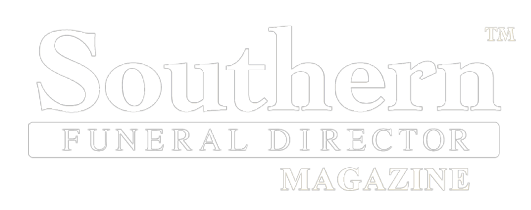(404) 312-6640
A PRACTICAL GUIDE TO SALE-LEASEBACKS FOR FUNERAL HOME OWNERS
A sale-leaseback enables a company to sell its real
estate to raise capital and subsequently lease the
property back from the purchaser. In this way, a company
can get both the cash and use of the asset it needs to
operate its business. Companies use leasebacks when
they need to utilize the cash they invested in an asset
for other purposes but they still need the asset itself
to operate their business. Sale-leasebacks can be
attractive as alternative methods of raising capital. The
most common users of sale-leasebacks are builders or
companies with high-cost fixed assets—like property,
land, or large expensive equipment. As such, leasebacks
are common in the building and transportation
industries, and the real estate and aerospace sectors.
Recently, they have become a viable option for funeral
home owners. Southern Funeral Director magazine sat
down with Connor Loughlin of Big Sky Capital Partners
to learn more.
Q. What Is a Sale-Leaseback from a Funeral
Service Perspective?
A. A sale-leaseback is a financial tool that allows you to sell
your funeral home’s real estate and lease it back from the buyer—
providing immediate capital without giving up control of
your operations. You stay in your building, serving families
just as you always have, but now with a lease agreement in
place instead of a mortgage or ownership.
Q. Why Should Funeral Home Owners Consider This?
A. As funeral service continues to evolve, many owners
are thinking about how to grow, invest in their business, or
plan for retirement. For most firms, real estate is one of the
largest assets on their books—yet that value is often tied up. A
sale-leaseback unlocks that equity and turns it into cash you
can use.
Whether you’re planning to expand to a second location,
renovate, reduce debt, or simply prepare for succession, a
sale-leaseback offers flexibility and financial freedom.
Q. How Does a Sale-Leaseback Work?
A. Through a sale-leaseback, you sell your funeral home’s
property to a buyer who understands your business —ideally
one who specializes in working with funeral homes and has
a thorough understanding of the operations inside the four
walls of a funeral home. At closing, you sign a long-term,
triple-net lease (typically 20 years) that allows you to stay in
the building and continue operating as usual. These are often
structured as “forever leases,” with options to extend, so you
can plan for the long term with confidence.
Q. What are the Benefits to a Funeral Home Owner?
A. There are several important benefits of a sale-leaseback:
• Immediate Access to Capital – Use the proceeds to reinvest
in your business, pay down debt, fund renovations,
or secure your retirement. • Debt Reduction & Improved Cash Flow – In today’s
high-interest environment, paying off debt with sale proceeds
can boost your bottom line.
• Keep Control of Your Business – You continue to own
and operate your funeral home, serve your families, and
maintain your brand and reputation—just without the
real estate on your books.
• Simplified Process – Compared to traditional bank
loans, sale-leasebacks typically involve less paperwork
and let you tap into 100% of your property’s value (vs.
only 50-70% with loans).
• Increase Business Value – Removing the real estate
can make your business more attractive to future buyers
and investors and widen the overall buyer pool.
• Reduce Distractions – A sale-leaseback allows you to
leave property management behind so you can focus on
the business and serving the community.
Q. How Can A Sale-Leaseback Provide
Opportunities for Owners to Grow Their Business?
A. For ambitious funeral home operators, growth through
acquisition or new development is often limited by the
availability of capital. A sale-leaseback can help operators
expand without tying up their balance sheet or taking on
additional debt. In growth scenarios, we acquire the real
estate of new locations and place the operator on a long-term
triple-net lease, effectively acting as a financing partner. This
allows operators to compete more aggressively in M&A opportunities
or open new locations—without relying on SBA
loans, traditional bank financing, or personal guarantees. A
sale-leaseback can give entrepreneurial operators the ability
to scale faster, with fewer financial constraints, while preserving
ownership and control of their core business.
Q. Could You Provide More Perspective on How
Sale-Leasebacks Provide Quick Access to Capital?
A. Funeral home and crematory operators often have
substantial equity tied up in their real estate. Through a
sale-leaseback transaction, that equity is unlocked by purchasing
the property with cash and placing the business on a
20-year triple-net lease with multiple renewal options. This
provides owners with immediate liquidity—without disruption
to their day-to-day operations, and leaving them in full
control of their business for the long-term. Whether the goal
is reinvestment, debt reduction, or simply building personal financial flexibility, a sale-leaseback is designed to put capital
back into the hands of those who have worked hard to build
their businesses.
Q. How Does a Sale-Leaseback Maximize Value
on the Sale of a Funeral Home?
A. A key challenge in selling a funeral home business is
capturing the full value of both the operations and the underlying
real estate. A sale-leaseback maximizes value by separating the real estate from the operating business, allowing
each to be valued independently. Buyers of funeral home
businesses primarily focus on EBITDA and typically do not
assign full value to the underlying real estate when making
an offer. By selling the real estate separately, the owner can
realize its full market value, rather than accepting a discounted
valuation bundled into the business sale. This structure
allows the seller to present a cleaner, higher-margin business
to potential buyers of the business, which can drive a higher
multiple on EBITDA. Lease payments become a predictable
operating expense, which buyers factor into their pro forma
without significantly reducing valuation. Overall, the strategy
unlocks trapped value in the real estate while optimizing
the presentation and valuation of the business.
Q. Can a Sale-Leaseback Simplify Succession
Planning for a Current Funeral Home Owner?
A. Succession planning in the funeral profession can be
emotionally and logistically complex. A sale-leaseback can
help simplify this transition. By converting real estate equity
into cash, owners can support next-generation operators
with the capital they need to take over and grow the business—
without burdening them with heavy real estate debt.
This also allows the departing generation to step back with
financial security, while ensuring continuity for families and
communities who depend on the funeral home’s services. A
long-term lease structure can also offer predictability in occupancy
costs for successors, making the business easier to
run and more attractive to future owners.
Q. How What Should You Consider When
Contemplating a Sale-Leaseback?
A. Every funeral home is different, and there’s no one-sizefits-
all approach when exploring a sale-leaseback. Key factors
include your building’s condition, how long you’ve been in
business, the number of families you serve, and your overall
market reputation. These elements help determine the value
and terms of your lease.
Q. Where Can A Funeral Professional Turn to For
Help?
A. That’s where Big Sky Capital Partners comes in. Big
Sky is a real estate investment firm focused exclusively
on the funeral profession. We understand the nuances of
funeral service—from tradition and community ties to longterm
operations—and we structure sale-leasebacks that
are tailored to your goals. Our mission is to be a trusted,
long-term partner who helps you unlock real estate value
so you can focus on what really matters: caring for your
families and your community. If you would like to learn
more about sale-leasebacks and other flexible real estate
solutions that allow for succession planning and stability,
contact us at connor@bigskycapitalpartners.com or visit
www.bigskycapitalpartners.com.






Comments